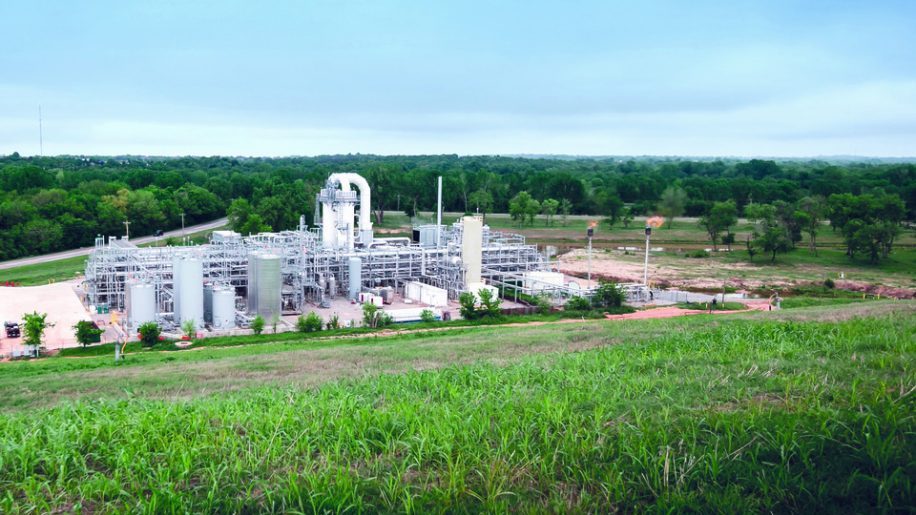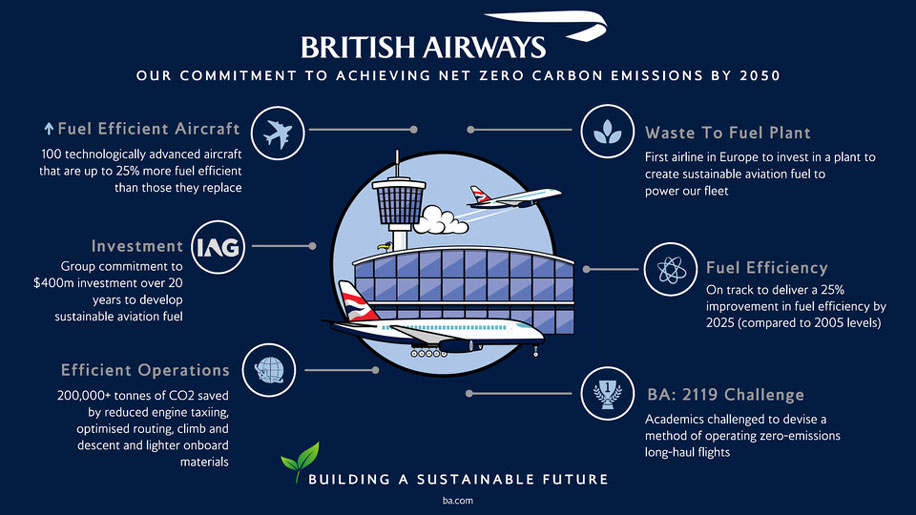
British Airways and its sister airlines in International Airlines Group (IAG), including Iberia, Aer Lingus, Vueling and Level, have committed to reach the UK government’s target of net zero carbon emissions by 2050.
As previously reported, British Airways has become the first UK airline to offset carbon emissions for all its UK domestic flights.
British Airways to offset emissions on all UK domestic flights
It has achieved this by investing in verified carbon reduction projects equivalent to the carbon emissions it creates for domestic flights. These include solar energy projects, forestation programmes and tree planting in South America, Africa and Asia.
The airline has also committed to further targets as stepping stones to the end goal.
- 2025 – reduce emissions by 20 per cent per passenger per kilometre
- 2030 – reduce emissions by 30 per cent per passenger per kilometre
- 2050 – net zero emissions
It is aiming to achieve this by:
- Replacing older aircraft with more than 70 new aircraft over the next five years, which are up to 25 per cent more carbon efficient than those they replace. More than 40 fuel-efficient aircraft are currently in operation. The airline says new wingtip technology has reduced CO2 emissions by 80m+ tonnes across the industry since 2000.
- Developing management incentives for employees to reduce carbon emissions.
- Parent company IAG is investing US$400 million in sustainable aviation fuel in the next 20 years. This includes British Airways’ partnership with specialist company Velocys and Shell to build Europe’s first household waste to jet fuel plant in the UK, which will start operations in 2024. The plant will turn household waste destined for landfill into sustainable fuel which produces 70 per cent less CO2 emissions than fossil fuel.
- IAG is exploring new carbon capture technology by partnering with US company Mosaic Materials via the group’s start-up accelerator Hangar 51. The start-up has created an innovative adsorbent material to take out CO2 emissions directly from the atmosphere.

British Airways is also changing the way it flies to reduce carbon emissions:
- Moving to a single engine taxi on the A320 fleet to save 3,700 tonnes of CO2 per year
- Removing flight manuals to save 2,300 tonnes of CO2 per year
- Adding lightweight seats to short-haul fleet to save 9,100 tonnes of CO2 per year
- Recording more accurate inflight wind/temperature data to save 12,600 tonnes of CO2 per year
- Introducing lighter food trollies to reduce emissions by 30,000 tonnes per year
- Making changes to its ground operations, for example trialling green driverless baggage vehicles, Mototok electric pushback vehicles and electric chauffeur driven cars which are more efficient and emissions free.

IAG also points out that inefficient use of airspace results in “18 million tonnes of CO2 wasted per annum in Europe” and is investigating more efficient, modern flight planning tools and trialling some of these right now. It also wants greater collaboration between airlines, airports and air traffic controllers.
In common with other airlines, one of the areas British Airways is also employing is market-based measures.
EU trading system
Since its introduction in 2012, the airline has paid to reduce carbon emissions through EU emissions reduction regulations (known as the Emissions Trading System). Since 2012 the airline has reduced emissions on European flights by more than eight million tonnes through the EU ETS, which equates to reducing emissions on every European flight by 40 percent.
CORSIA
IAG was involved in the United Nations’ first global carbon offsetting scheme named CORSIA (Carbon Offsetting and Reduction Scheme for International Aviation), which will enable aviation to cut its CO2 emissions by 2.5 billion tonnes between 2020 and 2035 through US$40 billion investment in regulated, carbon reduction projects in other sectors.
Customer carbon offsetting tool
While customers on UK domestic flights won’t need to offset their emissions (because British Airways has committed to doing so on their behalf), short-haul and upwards can use the British Airways’ carbon offsetting tool which allows them to calculate their emissions and then invest in carbon reduction projects including forestry and renewable energy projects in Peru, Sudan and Cambodia.
Using the tool customers will pay approximately £1 to offset a return flight from London to Madrid, travelling in economy, while from London to New York in business class will cost around £15. Customers can offset their emissions here.

BA says it is also “working to reduce our use of single use plastics on board and are actively seeking to source sustainable alternatives where possible”.
Examples of this include duvets in First made from recycled plastic bottles, a 6.5 tonne annual reduction in the plastic wrapping used on Club World amenity kits, 15p off tea or coffee purchases when customers bring their own cups, and the recruitment of over 170 “War on Waste” crew champions who will promote best practice and look for new opportunities to reduce waste onboard.
In addition the carrier says it is looking at alternatives to its current plastic swizzle sticks, and is removing the plastic wrapping around the ear buds given out in World Traveller, instead packing them directly into the Flying Start charity donations envelopes, which can then be reused for those wishing to donate.
Alex Cruz, British Airways’ Chairman and Chief Executive, said: “We know that air travel continues to grow, but we also know that our future has to be sustainable. Solving the complex issue of climate change requires a multifaceted response, and offsetting emissions on all flights within the UK is just one step that we are adopting to reduce our environmental impact while more solutions to decarbonise are found. Our emissions reductions projects are carefully chosen to ensure they are proven and deliver real carbon emissions reductions as well as economic, social and environmental benefits.”
“We continue to invest heavily in new aircraft that are 25% to 40% more fuel efficient than the aircraft they replace. We are also leading the way in the development of sustainable aviation fuel and have signed a partnership with renewable fuels company Velocys, to build a plant which will convert household and commercial waste into renewable sustainable jet fuel to power our fleet, a first for the UK and the first time an airline has done this in Europe.”












